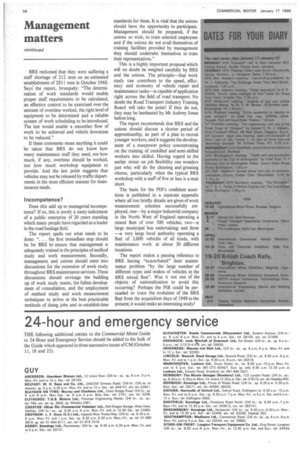Management matters
Page 60

If you've noticed an error in this article please click here to report it so we can fix it.
continued
BRS reckoned that they were suffering a staff shortage of 212 men on an estimated establishment of 2811 men in October 1968. Says' the report, brusquely: "The determination of work standards would enable proper staff requirements to be calculated, an effective control to be exercised over the amount of overtime worked, the right level of equipment to be determined and a reliable system of work scheduling to be introduced. The last would enable a smoother flow of work to be achieved and vehicle downtime to be reduced."
If these comments mean anything it could be taken that BRS do not know how many maintenance staff they need, nor how much, if any, overtime should be worked, nor how much workshop equipment to provide. And the last point suggests that vehicles may not be released by traffic departments in the most efficient manner for maintenance needs.
Incompetence?
Does this add up to managerial incompetence? If so, this is surely a nasty indictment of a public enterprise of 20 years standing which many people have regarded as a leader in the road haulage field.
The report spells out what needs to be done: ". . the first immediate step should be for BRS to ensure that management is adequately trained in the principles of method study and work measurement. Secondly, management and unions should enter into discussions for the extension of work study throughout BRS maintenance services. These discussions should envisage the building up of work study teams, the fullest development of consultation, and the employment of method study and work measurement techniques to arrive at the best practicable methods of doing jobs and to establish time standards for them. It is vital that the unions should have the opportunity to participate. Management should be prepared, if the unions so wish, to train selected employees and if the unions do not avail themselves of training facilities provided by management they should undertake themselves to train their representatives."
This is a highly important proposal which will no doubt be weighed carefully by BRS and the unions. The principle-that work stpdy can contribute to the speed, effici ency and economy of vehicle repair and maintenance tasks-is capable of application right across the field of road transport. No doubt the Road Transport Industry Training Board will take the point! If they do not, they may be lambasted by Mr Aubrey Jones before long.
The report recommends that BRS and the unions should discuss a shorter period of apprenticeship, as part of a plan to recruit younger workers, and it suggests the development of a manpower policy concentrating on the training of unskilled and semi-skilled workers into skilled. Having regard to the earlier stress on job flexibility one wonders just who will do the cleaning and greasing chores, particularly when the typical BRS workshop with a staff of five or less is a man short The basis for the PIB's confident assertions is published in a separate appendix where all too briefly details are given of work measurement schemes successfully employed, one-by a major industrial company in the North West of England operating a mixed fleet of over 500 vehicles; two-a large municipal bus undertaking; and three -a very large local authority operating a fleet of 2,000 vehicles of all kinds, with maintenance work at about 30 different locations.
The report makes a passing reference to BRS having "exacerbated" their mainte nance problem "by the large number of different types and makes of vehicles in the BRS mixed fleet". Was it not one of the objects of nationalization to avoid this occurring? Perhaps the PIB could be persuaded to trace the evolution of the BRS fleet from the acquisition days of 1948 to the present; it would make an interesting study!








































































































